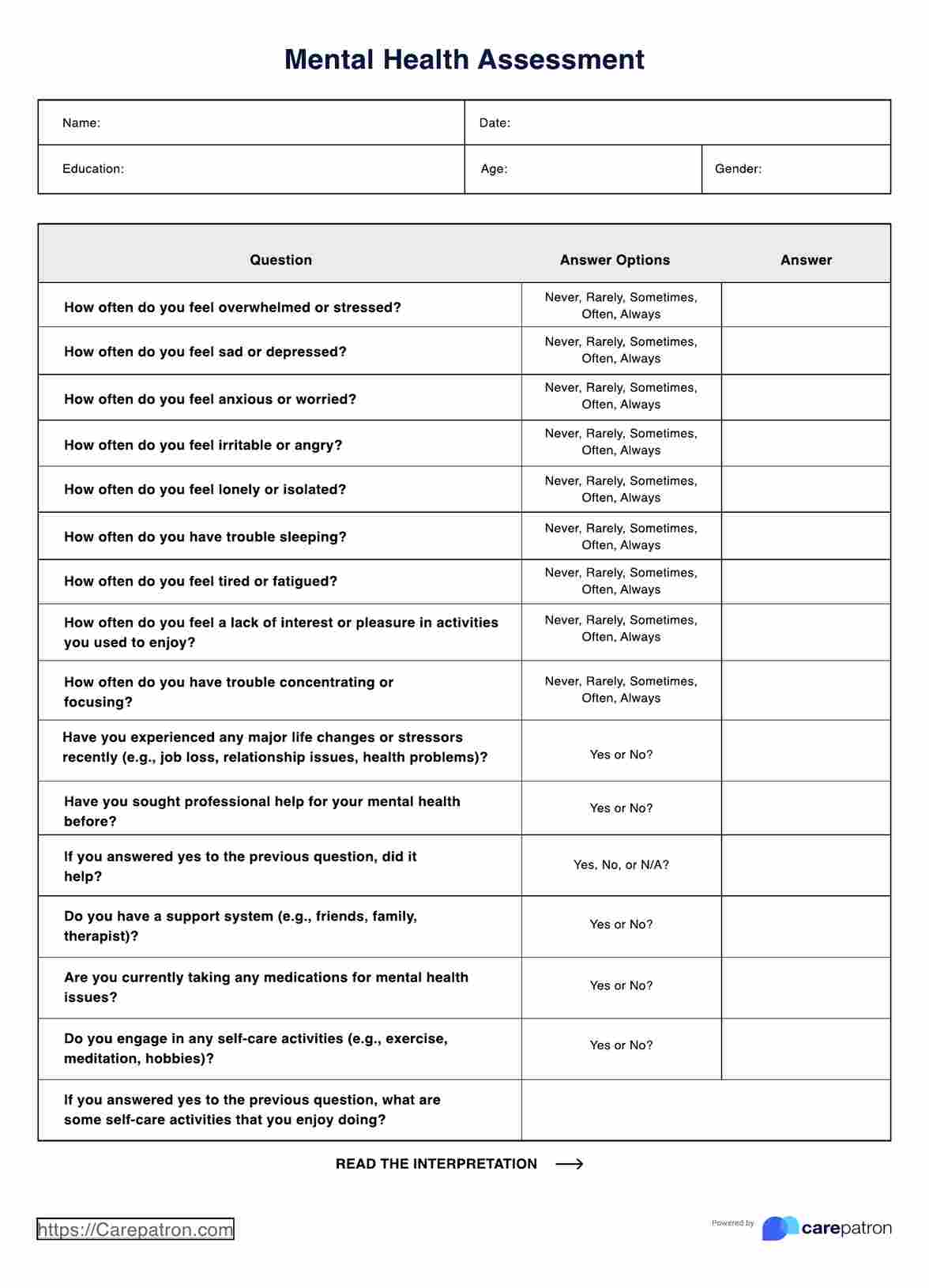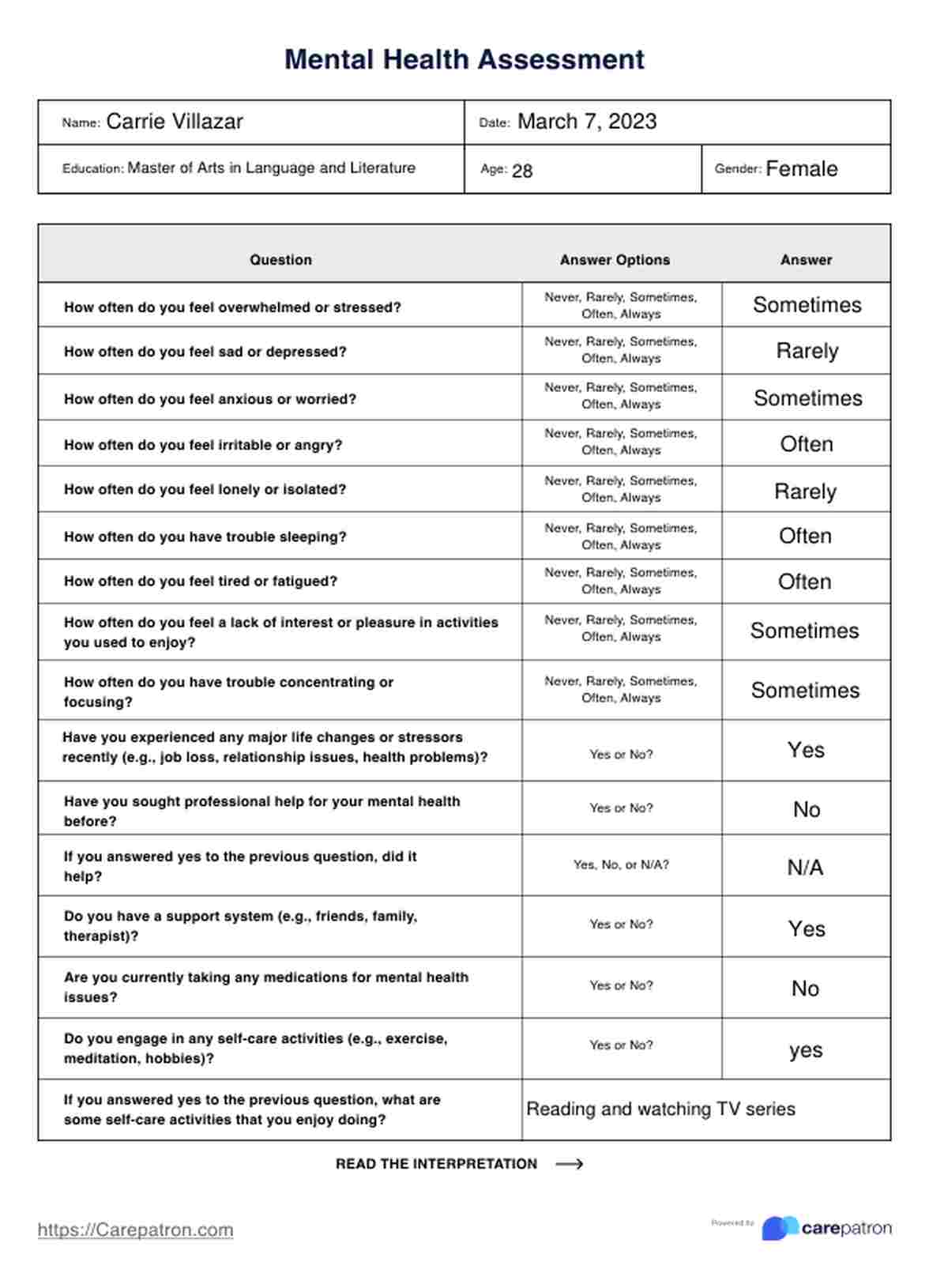
Discover how to use a mental health assessment with our guide. Includes a sample template, interpretation, FAQs, and benefits of using a free assessment.

By Audrey Liz Perez on Aug 08, 2024.
Fact Checked by RJ Gumban.


A Mental Health Assessment is a comprehensive tool for assessing a person's emotional and psychological well-being. It aids in identifying any mental health issues or conditions that a person may be experiencing. This assessment is not just a snapshot but a detailed picture of a person's mental health. It is also an essential component of mental health treatment because it establishes a baseline for understanding a person's mental health condition.
A Mental Health Assessment form uses various methods, including self-assessment questionnaires, clinical interviews, and psychological tests. These evaluation forms assist clinicians and other mental health professionals in understanding the nature and severity of an individual's symptoms and mental health history. They can also be useful in identifying risk and protective factors and determining the best treatment approach.
This assessment can be considered part of the mental health intake process. A mental health specialist can also use it to track treatment progress and determine if any changes are required.
PDF Template Example PDF

Mental Health Assessment tools play a crucial role in identifying, diagnosing, and monitoring various mental health conditions and a possible related physical illness. These psychological assessment tools include the following:
When used in conjunction with in-depth clinical interviews tackling family history, medical history, and drug and alcohol use, as well as previous experience with a mental health problem, these psychological testing tools contribute to a comprehensive understanding of a patient's status to improve their overall mental well-being.
This Mental Health Assessment template can be useful in clinical and psychiatric practice. Here's a step-by-step guide to using and filling out this assessment:
The free template is downloaded and printed as the first step in using the Mental Health Assessment. It is easily accessible online and available in PDF format.
Give your client a copy and explain how the assessment works. Inform them that it consists of questions about their current well-being, lifestyle, physical health, and other factors, which will help identify potential issues.
As a mental health provider, you should encourage your client to be honest and open while completing the assessment. Assure their answers are confidential and will only be used for treatment.
After your client completes this patient health questionnaire, review the answers together. This is an opportunity to discuss any concerns or patterns that may have emerged from the assessment and determine if further evaluation or treatment is needed.
A Mental Health Assessment becomes essential in various circumstances, serving as a valuable tool to identify, understand, and address mental health concerns.
If an individual is experiencing symptoms of mental health conditions such as depression, anxiety, post-traumatic stress disorder (PTSD), mood disorders, attention-deficit/hyperactivity disorder (ADHD), generalized anxiety disorder, or other mental health disorders, a Mental Health Assessment is warranted. This can help provide a general baseline that can be used with lab tests for accurate diagnosis and treatment planning.
In cases where there is a suspected onset of mental disorders or cognitive impairment, seeking the expertise of a mental illness professional becomes imperative. Early assessment can aid in prompt diagnosis and developing an effective treatment plan.
Individuals with a prior history of mental illness or with family members who have one can undergo regular Mental Health Assessments to monitor their well-being and identify any emerging challenges. This proactive approach can contribute to long-term mental health management.
When individuals feel overwhelmed, stressed, or find it challenging to cope with life's demands, they should consult a mental health provider for an assessment. This step can help address underlying issues and provide coping strategies.
Employers, educational institutions, or legal entities may require individuals to undergo these screening measures or tests in certain situations. Compliance with these requests is crucial for continued well-being and meeting specific criteria.